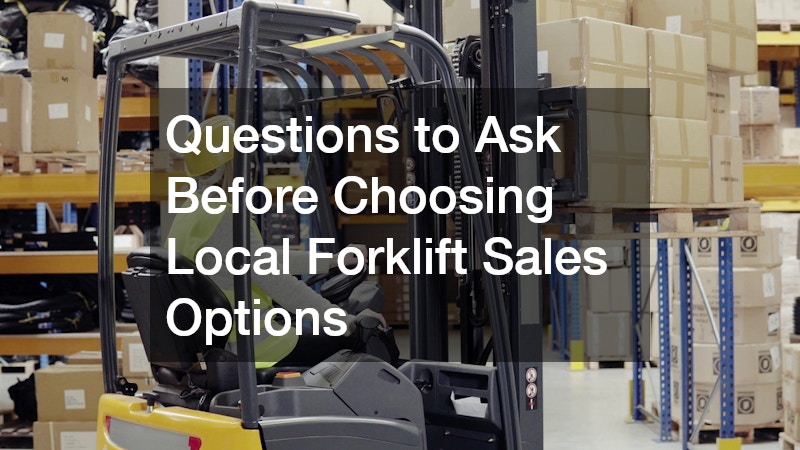This article discusses the key questions to consider when selecting local forklift sales options, ensuring you make an informed decision that aligns with your operational needs. Choosing the right forklift is critical for maintaining efficiency, safety, and productivity in any warehouse or industrial environment. Local dealers often provide the advantage of hands-on inspections, personalized advice, and flexible support for your specific requirements. Factors such as load capacity, fuel type, maneuverability, and maintenance needs should all be considered before making a purchase. Additionally, understanding warranty options, service packages, and financing plans can help you select a solution that fits your budget while ensuring long-term reliability and performance for your operations. Understanding the variety of forklift options available can help you choose the right machinery for your specific tasks and requirements. There are several categories of forklifts, including electric, diesel, and LPG (liquefied petroleum gas) models. Each type serves distinct purposes and environments, impacting performance and efficiency in varying operational settings. Additionally, within these categories, forklifts come in different capacities and configurations, such as stand-up reach trucks, pallet jacks, and counterbalance forklifts. It’s beneficial to assess your site layout and material handling needs to determine which forklift type will provide the best advantages. For instance, if you operate in tight spaces, a compact model may make a significant difference in maneuverability. Moreover, consider any specific features or attachments that might enhance the capabilities of your forklift. Options may include extended forks, specialized masts for high storage, or advanced safety features. Understanding your operational demands will guide you in selecting a model that aligns perfectly with your business activities. Comparing pricing from various local dealers can impact your budget and overall purchasing decision. Forklift pricing can vary significantly based on several parameters including make, model, age, and condition. Therefore, it’s crucial to gather quotes from multiple dealers to ascertain competitive pricing and potential savings. Additionally, keep in mind that the lowest price isn’t always the best deal. A cost-effective forklift may come with trade-offs such as reduced reliability or higher maintenance costs. It’s essential to weigh the initial purchase price against potential long-term expenses to avoid unforeseen budget strains. Furthermore, understand the total cost of ownership, which includes financing options, ongoing maintenance, and applicable taxes. Some dealers offer financing plans that can make a significant difference in your cash flow, so exploring these options can be beneficial as you evaluate the total costs associated with purchasing your forklift. Investigating warranty terms and service options will inform you about maintenance and support for your future forklift investment. A good warranty can provide peace of mind, covering repairs and parts replacements in case of defects or malfunctions. It’s vital to understand what is included in the warranty period and for how long you will be covered. Additionally, service options offered by local dealers are critical when it comes to the longevity and performance of your forklift. Some dealers may provide on-site service, while others have service centers where you might have to take your forklift. Knowing these logistics ahead of time can prevent disruptions in operation if repairs are needed. Leadership in customer service can also vary, so it is essential to evaluate dealers on their responsiveness and availability for service or emergency maintenance. Fast, reliable support can minimize downtime and optimize operational efficiencies, making it an important factor in your purchasing decision. Analyzing customer feedback can provide insight into others’ experiences with specific local forklift sales options, helping you gauge reliability and quality. Reading reviews from previous customers can highlight potential issues or benefits regarding a dealer’s equipment or service. This first-hand information can be invaluable in your decision-making process. Additionally, consider reaching out directly to existing users of the forklifts models you’re interested in. They can provide you with practical insights that go beyond what you see in reviews and can clarify how well a particular model suits your operational demands. Moreover, some dealers might showcase testimonials on their websites. Ensure you are looking for diverse feedback from various industries, as different applications can yield different experiences and levels of satisfaction with the equipment. This broad view can help paint a more complete picture, allowing you to choose wisely from the available local forklift sales options. By asking the right questions regarding available types, pricing, warranties, and customer feedback, you can make a more informed decision when choosing local forklift sales options. Understanding your needs and comparing different options ensures that you choose a forklift that operates efficiently and reliably within your budget. Making leaps in preparation can lead you to a wise investment that supports your business’s specific material handling challenges. What Types of Forklifts Are Available for Sale?
How Does the Pricing Compare Across Different Local Dealers?
What Are the Warranty and Service Options Offered?
What Do Customer Reviews and Testimonials Say?


